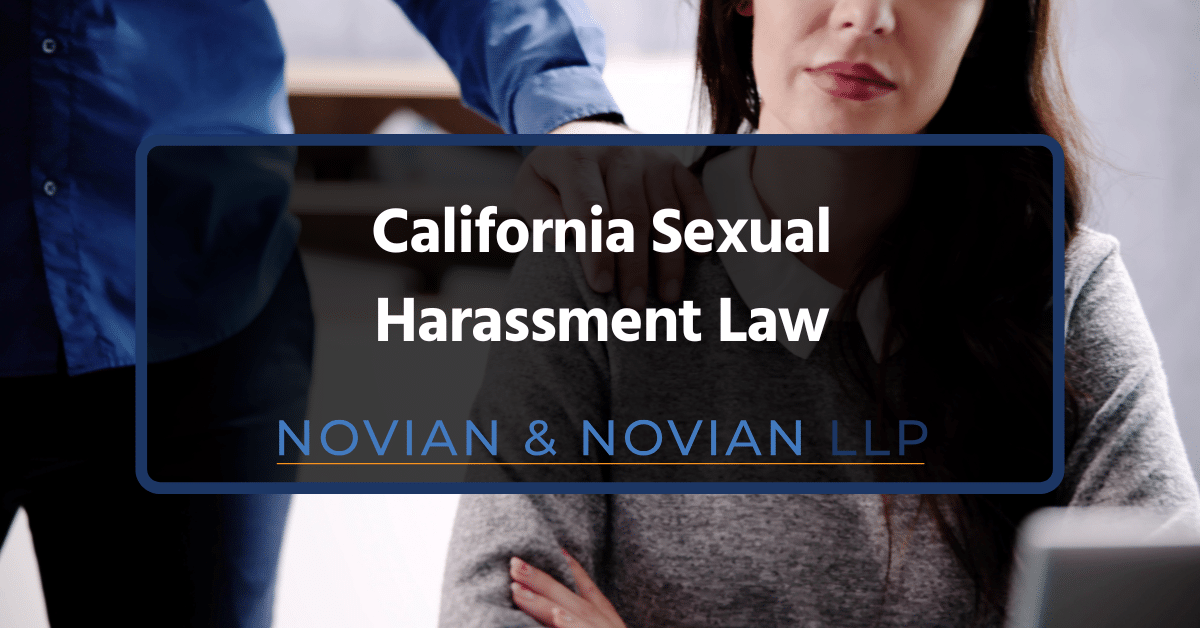Sexual harassment in the workplace can lead to long-lasting emotional trauma for victims, foster toxic work environments, and expose employers to serious legal and financial consequences. It undermines employee well-being and productivity, and when left unchecked, can tarnish a company’s reputation beyond repair. That’s why understanding California’s sexual harassment laws is not only a legal requirement but also a crucial part of building a safe and respectful workplace.
California has some of the strongest and most employee-protective sexual harassment laws in the country. These laws go beyond federal standards, offering broader definitions of harassment and stronger protections for employees.
California’s sexual harassment laws can be complex, but you don’t have to do it alone. At Novian & Novian, we have extensive experience in employment law and represent both employers and employees in harassment-related matters. If you’re facing a legal challenge or need help implementing a compliant workplace policy, our workplace sexual harassment defence lawyers in California are here to support you. Schedule a free consultation with us today!
This post will give an overview of California sexual harassment law, including the obligations of employers, what qualifies as harassment under state law and the specific responsibilities employers must uphold. You’ll also learn practical steps for properly handling sexual harassment complaints in the workplace, from conducting investigations to implementing preventative policies.
Table Of Contents
- What Is Workplace Sexual Harassment in California?
- An overview of California’s Sexual Harassment Law
- Employer Obligations Under California Sexual Harassment Law
- How to Handle Sexual Harassment Complaints as an Employer
- What Happens After a Complaint?
- Best Practices for Employers to Prevent Sexual Harassment
- Protect Your Firm With a California Sexual Harassment Lawyer
What Is Workplace Sexual Harassment in California?
Workplace sexual harassment in California is defined under the Fair Employment and Housing Act (FEHA) as any unwelcome conduct of a sexual nature that negatively impacts an individual’s work environment or employment status. This includes behavior based on an individual’s sex, gender identity, gender expression, sexual orientation, or related medical conditions. Compared to federal laws, California sexual harassment law provides broader and more specific protections for employees across all industries.
In California, harassment in the workplace goes far beyond physical acts. It includes unwelcome verbal, non-verbal, visual, and physical conduct that would offend a reasonable person. For instance, making sexual jokes, comments, or innuendos, giving unsolicited compliments on someone’s physical appearance, or making inappropriate remarks about their body can all be considered harassment if they create discomfort or a hostile environment.
Other examples of sexual harassment in California include sending sexually explicit messages or emails, making suggestive phone calls, unwelcome touching or hugging, or even standing too close without someone’s consent. It can also involve posting or sharing offensive memes or cartoons with sexual content, displaying sexually explicit images at work, or engaging in inappropriate physical advances, like brushing against someone’s body.
Importantly, workplace sexual harassment can occur between any individuals in a work setting. It’s not limited to cases involving a boss and an employee. It can happen between co-workers, from a supervisor to a subordinate, or even involve third parties such as clients, customers, or vendors. The law protects employees, interns, volunteers, and independent contractors, reflecting California’s strong stance against employment discrimination and gender-based harassment.
Employers have a legal duty to prevent sexual harassment by implementing a clear sexual harassment policy, offering sexual harassment training, and establishing effective complaint procedures. Failure to address or prevent harassment could result in a sexual harassment lawsuit, punitive damages, or claims of civil rights violations.
Types of Sexual Harassment Covered by California Law
Under California law, there are several types of sexual harassment that may lead to a workplace sexual harassment case. The first is quid pro quo harassment, where job benefits such as promotions, raises, or continued employment are made conditional on sexual favors or unwanted sexual advances. This form of harassment is particularly serious because it ties an employee’s livelihood directly to sexual acts or compliance with harassing behavior.
The second and most common form is the hostile work environment, where persistent or severe sexually harassing behavior makes the workplace intimidating, offensive, or abusive. This can result from a single egregious act or repeated conduct. It could be sexually explicit conversations, sharing graphic content, or inappropriate touching that interferes with an employee’s ability to do their job.
California also recognizes third-party harassment, which occurs when someone who is not employed by the company, such as a client, vendor, or customer, commits harassment, and the employer fails to act after being made aware of the situation. Regardless of who commits the harassment, the employer is still legally responsible for maintaining a safe and respectful workplace for all.
An overview of California’s Sexual Harassment Law
California has some of the most comprehensive and employee-friendly laws in the country when it comes to workplace sexual harassment. The primary statute governing sexual harassment in California is the Fair Employment and Housing Act (FEHA), which is enforced by the California Civil Rights Department.
This law prohibits harassment in the workplace based on sex, gender identity, gender expression, sexual orientation, marital status, military and veteran status, related medical conditions, and other protected characteristics. It defines sexual harassment broadly to include both quid pro quo harassment and hostile work environment claims.
In addition to FEHA, the California Labor Code imposes obligations on employers to provide a harassment-free workplace. California’s protections go far beyond those provided under federal law, such as Title VII of the Civil Rights Act of 1964, which only applies to employers with fifteen or more employees. In contrast, California law applies to employers with few employees, and in some cases, even protects workers in smaller operations.
One of the major differences between California sexual harassment law and federal and state laws elsewhere is the scope of individuals covered. California law protects employees, job applicants, interns, volunteers, and even independent contractors from being sexually harassed at work. The law also provides protection regardless of whether the harassment is committed by a co-worker, supervisor, client, or third party.
When Is Sexual Harassment Considered a Crime?
While most sexual harassment cases are handled through civil lawsuits, certain behaviors rise to the level of criminal conduct. For example, if someone is sexually assaulted, groped, or subjected to physical sexual violence, the behavior may violate the California Penal Code. Acts such as sexual battery, rape, or making criminal threats of a sexual nature are not only grounds for a sexual harassment claim but also for criminal prosecution. In these cases, law enforcement may get involved, and perpetrators may face jail time, fines, and a criminal record.
The distinction between civil vs. criminal sexual harassment is important. A civil lawsuit is filed by the victim seeking compensation, while criminal harassment involves the state pressing charges against the perpetrator. Both systems are designed to stop sexual harassment, hold offenders accountable, and protect the rights of sexual harassment victims.
Recent Updates to California Sexual Harassment Laws
California continually evolves its legal framework to strengthen protection against harassment in the workplace. Recent legislative changes have further expanded employer obligations and employee protections. AB 2053 added “abusive conduct” training requirements to existing sexual harassment training laws. Meanwhile, SB 1343 mandated that all employers with five or more employees must provide sexual harassment prevention training to both supervisory and non-supervisory employees.
Another key development is SB 1300, which made several important changes to California’s fair employment and housing standards. This law limits the use of nondisclosure agreements in settlement contracts involving sexual harassment claims, encouraging greater transparency and accountability. It also clarified that a single incident may be sufficient to create a hostile work environment if it interferes with the victim’s ability to work.
In 2024, new updates to California sexual harassment law have further emphasized the importance of regular training, stronger reporting protocols, and support for victims of gender-based harassment, unwanted sexual advances, and retaliation. Employers are now advised to review and update their sexual harassment policy regularly and ensure employees understand how to report harassment when it happens.
Employer Obligations Under California Sexual Harassment Law
Under California sexual harassment law, employers carry significant responsibilities when it comes to preventing and addressing workplace harassment. Prevention is the first line of defense. Employers are legally required to take all reasonable steps to prevent sexual harassment in the workplace, which includes creating a safe and respectful environment for employees, job applicants, interns, and independent contractors. Failing to do so can lead to sexual harassment complaints, civil lawsuits, and potential punitive damages if the employer is found negligent.
One of the most important mandates is the sexual harassment prevention training requirement. Under laws like SB 1343, employers with five or more employees must provide regular sexual harassment training to both supervisory and non-supervisory staff. This training must cover how to identify quid pro quo sexual harassment, hostile work environment situations, and conduct of a sexual nature that could reasonably be interpreted as harassment in the workplace. Additional training may be necessary for behaviors related to gender identity, sexual orientation, gender expression, and related medical conditions.
In addition to training, employers must establish clear, comprehensive sexual harassment policies that are distributed to all employees. These policies should explain what constitutes sexual harassment, how to recognize unwanted sexual advances, and the procedures for reporting harassment. These policies must be easily accessible and include protections for those who come forward with a sexual harassment claim.
Confidential and secure reporting mechanisms are also essential. Employers must set up internal channels that allow workers to report instances of sexually harassing behavior without fear of retaliation. The reporting process should respect the privacy of the individual and ensure timely action.
Most importantly, once a sexual harassment complaint is received, employers are obligated to investigate the claims promptly and thoroughly. The California Fair Employment and Housing Act (FEHA) requires that investigations be impartial, well-documented, and lead to appropriate corrective actions if harassment is confirmed. Whether the harasser is a co-worker, supervisor, or even a third party, the employer must act swiftly to protect the rights and dignity of the employee.
By adhering to these obligations, employers not only comply with state laws but also help prevent workplace sexual harassment lawsuits, protect against employment discrimination, and promote a culture of respect and accountability.
How to Handle Sexual Harassment Complaints as an Employer
When an employee reports harassment in the workplace, it is essential for the employer to respond decisively to protect the victim and ensure compliance with state laws such as the Fair Employment and Housing Act (FEHA) and California Labor Code.
Below are the steps to follow:
Acknowledge the Complaint Promptly
The first step in managing a workplace sexual harassment claim is to immediately acknowledge receipt of the complaint. The employer must reassure the complainant that the issue is being taken seriously and that it will be addressed according to the company’s sexual harassment policy and California sexual harassment laws.
Employees must be informed that retaliation, including subtle forms like demotion, exclusion, or threats, will not be tolerated under any circumstances. Upholding the employee’s legal rights throughout the process is critical, and the company should emphasize its commitment to maintaining a respectful and safe work environment for all, regardless of gender identity, sexual orientation, military and veteran status, or marital status.
Contact an Employment Lawyer
Before proceeding further, it’s highly recommended that the employer contact an experienced employment lawyer to ensure the investigation is conducted in full compliance with both company policy and federal and state laws. A qualified California sexual harassment lawyer can help determine the appropriate steps, offer insight into legal defenses, and reduce the employer’s exposure to punitive damages in the event of a civil lawsuit.
Legal defense for employers is especially important when navigating complex areas like employment discrimination, handling reports involving sexual assault, or interpreting interactions that may have crossed the line into sexual violence or criminal harassment under the California Penal Code. For employers seeking trusted legal representation, you need to work with a trusted sexual harassment lawyer, like Novian & Novian attorneys!
Conduct a Fair and Thorough Investigation
Once the process begins, it is important to carry out a timely and impartial investigation. Employers should interview the sexually harassed individual, the accused, and any co-workers who may have witnessed the harassment being committed.
The purpose is to determine whether the conduct constitutes sexual harassment and whether it created a hostile work environment or violated the sexual harassment act under California law or federal law, such as Title VII of the Civil Rights Act. All discussions must be conducted with confidentiality and professionalism to protect those involved.
Employers should establish a clear timeline for the investigation and ensure that all parties are kept informed throughout the process. When harassment has indeed happened, prompt corrective actions are necessary to stop workplace harassment and prevent further harm.
Ensure No Retaliation
One of the key obligations under California fair employment standards is protecting employees from any form of retaliation after reporting sexual harassment. Employers must reiterate their zero-tolerance stance on retaliatory behavior. This includes protection for the complainant, any witnesses, and other participants in the investigation. Should any retaliatory action occur, it must be dealt with swiftly through disciplinary action.
After the investigation is complete, both the complainant and the accused should be notified of the findings. If the results confirm that sexual harassment occurred, corrective measures may range from written warnings to termination of the sexual harasser, depending on the severity of the behavior.
Beyond resolving the specific incident, employers have a continued responsibility to ensure a safe and inclusive workplace. That includes reassessing the existing sexual harassment training program, strengthening internal reporting harassment procedures, and considering additional education for all employees. Consistent sexual harassment prevention training helps reinforce workplace standards, especially in environments with fifteen or more employees, and shows ongoing compliance with employment and housing act provisions.
What Happens After a Complaint?
When a sexual harassment complaint is filed with the California Department of Fair Employment and Housing (DFEH), now known as the Civil Rights Department (CRD), the agency initiates a formal investigation under the Fair Employment and Housing Act (FEHA). The DFEH assesses whether the actions constitute sexual harassment under California law and applicable federal law, such as Title VII of the Civil Rights Act.
The DFEH plays a central role in determining if the harassment committed violates the employee’s legal rights. This involves interviewing the sexually harassed individual, the alleged sexual harasser, and potential co-workers who may have witnessed the conduct. If the agency finds the conduct is considered sexual harassment, the employer may be required to participate in mandatory mediation or other resolution efforts. The complaint may result in a civil lawsuit if the case is not settled or if the employee receives a “right to sue” notice, allowing them to proceed with a sexual harassment lawsuit (litigation).
Employers who fail to adequately respond to or resolve workplace sexual harassment complaints face serious legal and financial consequences. These include administrative penalties from the DFEH, civil liability in the form of a sexual harassment lawsuit, and potentially devastating punitive damages if the conduct was especially egregious or if the employer fails to act despite knowing that harassment happened. Companies must remember that ignoring or mishandling such cases is a violation of California fair employment standards and can lead to claims of employment discrimination.
Penalties for Employers Who Fail to Comply
Failing to comply with sexual harassment laws can result in extensive penalties under California sexual harassment law and federal regulations. These include government-imposed fines, court-mandated damages, and expensive settlements. In cases involving multiple sexual harassment cases or widespread workplace harassment, the financial impact can be devastating.
Beyond the legal and financial repercussions, there is also significant reputational damage for businesses that fail to address harassment. Public awareness of sexual violence, sexually assaulted employees, and quid pro quo sexual harassment can lead to loss of consumer trust and partnerships.
Within the organization, employee morale can plummet, especially if individuals feel unsafe or believe that complaints of experienced sexual harassment are ignored. Over time, this creates a toxic work culture that undermines productivity, increases turnover, and makes talent retention difficult.
Best Practices for Employers to Prevent Sexual Harassment
Preventing workplace sexual harassment begins with building a proactive culture where respectful conduct is not only expected but consistently demonstrated, especially by leadership. The role of management and executives is crucial in setting the tone for appropriate behavior and reinforcing a zero-tolerance approach to all forms of sexual harassment. When leadership models respect and accountability, it sends a clear message that harassment in the workplace will not be tolerated.
One of the most effective tools employers have is regular, ongoing sexual harassment prevention training for all employees, including supervisors. Under California sexual harassment law, businesses with fifteen or more employees are legally required to provide such training. These programs must address what constitutes sexual harassment, from unwanted sexual advances and sexual favors to more subtle forms of gender-based harassment.
Training also serves to raise awareness about the rights of employees under the Fair Employment and Housing Act (FEHA) and federal law. It also includes protections for gender identity, gender expression, sexual orientation, mental disability, related medical conditions, and military and veteran status.
To truly stop sexual harassment, employers must create an inclusive and respectful environment that prioritizes early intervention and support. This involves not only maintaining a clear and comprehensive sexual harassment policy but also providing multiple, confidential channels for reporting sexual harassment. Employers should review and update these policies regularly to ensure alignment with current state laws, federal and state laws, and guidelines from agencies such as the California Department of Fair Employment and Housing (DFEH).
In the event that harassment occurs, proper documentation can be critical, especially if the complaint escalates into a sexual harassment lawsuit or a civil lawsuit. Maintaining accurate records of complaints, investigations, training sessions, and sexual harassment claims is essential for legal compliance and organizational transparency.
Employers should also seek guidance from qualified HR professionals or California sexual harassment lawyers to ensure full compliance with both the sexual harassment act and California fair employment standards. Legal counsel can offer invaluable insights, particularly when navigating complex issues involving sexually harassed employees, potential punitive damages, or accusations involving sexual violence or sexual assault.
Protect Your Firm With a California Sexual Harassment Lawyer
California employers are required under both state laws and federal law to take proactive measures against workplace sexual harassment. From implementing strong internal policies and providing mandatory sexual harassment prevention training to thoroughly investigating every sexual harassment complaint, employers must remain vigilant and compliant. Failure to act can lead to severe consequences, including financial penalties, punitive damages, and a workplace sexual harassment lawsuit that can devastate a company’s finances and public image.
Employers and employees alike must educate themselves about their legal rights under the Fair Employment and Housing Act (FEHA) and other relevant laws. Every organization, regardless of size or industry, should foster a respectful environment where reporting harassment is encouraged and retaliation is not tolerated. Prevention, early reporting, and proper handling of complaints are essential not only for legal compliance but also for maintaining employee morale and trust.
If your business is facing a complaint or you’re seeking legal clarity, our experienced team at Novian & Novian can help. As one of the best employment attorneys in California, we offer expert legal guidance tailored to your situation. Reach out today for a free consultation.









